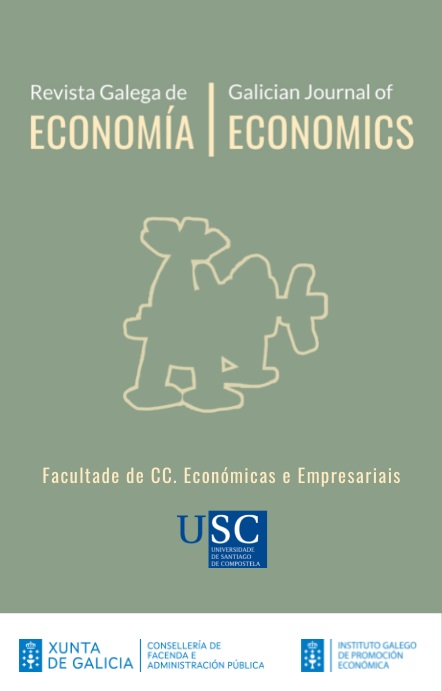Os estudos sobre políticas rexionais de innovación nas dúas últimas décadas: desde os sistemas rexionais de innovación ás estratexias de especialización intelixente
Contido principal do artigo
Detalles do artigo
Referências
Asheim, B. T.; e Isaksen, A. (1997). Location, agglomeration and innovation: Towards regional innovation systems in Norway? European Planning Studies, 5(3), 299-330. DOI: https://doi.org/10.1080/09654319708720402
Barca, F., McCann, P., e Rodríguez‐Pose, A. (2012). The case for regional development intervention: Place‐based versus place‐neutral approaches. Journal of Regional Science, 52(1), 134-152. DOI: https://doi.org/10.1111/j.1467-9787.2011.00756.x
Becattini, G. (1990). The Marshallian industrial district as a socio-economic notion. En F. Pyke, G. Becattini e W. Sengenberger (Eds.), Industrial districts and inter-firm co-operation in Italy (pp. 37-51). Geneva, Switzerland: International Institute for Labour Studies. DOI: https://doi.org/10.1177/002218569103300114
Cooke, P. (1992). Regional innovation systems: Competitive regulation in the new Europe. Geoforum, 23(3), 365- -382. DOI: https://doi.org/10.1016/0016-7185(92)90048-9
Cooke, P. (2001). Regional innovation systems, clusters, and the knowledge economy. Industrial and Corporate Change, 10(4), 945-974. DOI: https://doi.org/10.1093/icc/10.4.945
Cooke, P., Uranga, M. G., e Etxebarria, G. (1997). Regional innovation systems: Institutional and organisational dimensions. Research Policy, 26(4-5), 475-491. DOI: https://doi.org/10.1016/s0048-7333(97)00025-5
Edquist, C. (Ed.). (2013): Systems of innovation: Technologies, institutions and organizations. London, England / New York, NY: Routledge.
Foray, D. (2014). Smart specialisation: Opportunities and challenges for regional innovation policy. London, England / New York, NY: Routledge.
Howells, J. (1999). Regional systems of innovation. En D. Archibugi, J. Howells e J. Michie (Eds.), Innovation policy in a global economy (pp. 67-93). Cambridge, England: Cambridge University Press. DOI: https://doi.org/10.1017/cbo9780511599088.007
Lundvall, B. Å. (1992). National systems of innovation: Towards a theory of innovation and interactive learning. London, England: Pinter.
McCann, P. (2015). The regional and urban policy of the European Union: Cohesion, results-orientation and smart specialisation. Cheltenham, England / Northampton, MA: Edward Elgar. DOI: https://doi.org/10.1111/grow.12142
Metcalfe, J. S., e Georghiou, L. (1997): Equilibrium and evolutionary foundations of technology policy. Manchester, England: University of Manchester, Centre for Research on Innovation and Competition.
Porter, M. E. (2000). Location, competition, and economic development: Local clusters in a global economy. Economic Development Quarterly, 14(1), 15-34. DOI: https://doi.org/10.1177/089124240001400105
Rodrik, D. (2005). Growth strategies. En P. Aghion e S.N. Durlauf (Eds.), Handbook of economic growth, vol. 1 (pp. 967-1014). Oxford, England / San Diego, CA: North Holland.
Scott, A. J. (1988). Flexible production systems and regional development: The rise of new industrial spaces in North America and Western Europe. International Journal of Urban and Regional Research, 12(2), pp. 171-186. DOI: https://doi.org/10.1111/j.1468-2427.1988.tb00448.x
Storper, M., e Harrison, B. (1991). Flexibility, hierarchy and regional development: The changing structure of industrial production systems and their forms of governance in the 1990s. Research Policy, 20(5), pp. 407-422. DOI: https://doi.org/10.1016/0048-7333(91)90066-y
Uyarra, E. (2010). What is evolutionary about ‘regional systems of innovation’? Implications for regional policy. Journal of Evolutionary Economics, 20(1), 115. DOI: https://doi.org/10.1007/s00191-009-0135-y
Artigos mais lidos pelo mesmo (s) autor (es)
- Manuel González-López, Xulia Guntín-Araújo, Evolución da política galega de innovación: de cero á especialización intelixente , Revista Galega de Economía: v. 28 n. 2 (2019): Special Issue. Studies on regional innovation policies in the last two decades: from regional systems of innovation to intelligent specialization strategies
- José Blanco-Álvarez, Manuel González-López, Emigración e fuga de cerebros en Galicia, 2001-2019 , Revista Galega de Economía: v. 31 n. 1 (2022)






